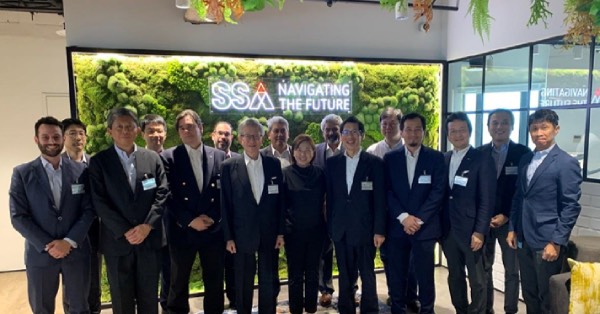The Shipping Policy Committee and Safe Navigation and Environment Committee of the Asian Shipowners’ Association , held a joint meeting for the first time today to discuss environmental and navigational safety issues, whilst taking into account the impact of economic and shipping policy considerations on aspects of their work.
There are five Standing Committees in the ASA, who usually discuss their own agenda items. Given that the issues which both committees represent are increasingly interlinked, Mr Keiji Tomoda, Chair of the SPC, who proposed the joint session on this occasion, emphasized; “The COVID pandemic reminded us of the criticality of maritime trade and just how important it was for the shipping industry to collaborate with all associated stakeholders, in order to maintain sustainable supply chains. It has also been recognized, that environmental protection, through a circular economy, can only be also achieved by working together. However, it needs to be appreciated that all of these issues have to consider navigational aspects to ensure the safety of all concerned. With this in mind, I am convinced that multi-layered discussions, through a joint session of both Committees, could only act as a driving force to tackle such important issues more efficiently”.

During the joint session, Mr Simon Bennett, Deputy Secretary General, ICS,explained the impacts of global and regional environmental regulations on the shipping industry, saying “ ICS is pleased to join ASA members to increase understanding of the global industry’s Fund and Reward proposal to IMO, ahead of the critical IMO meeting in July, and promote the urgent need to encourage governments to take this forward – together with a global fuel standard – to incentivise first movers with rewards for the rapid production and take-up of low and zero GHG fuels, which will be necessary for shipping to achieve net zero emissions mid-century”. In this context, Ms Caroline Yang, Chair of SNEC, added that; “International shipping needed to be regulated at a global level and not at any regional level, because this will only lead to excessive administrative burden and confusion for the industry. This is consistent with ASA’s long-standing position to support a predictable and uniformed approach to regulating GHG emissions that all
shipping sectors will be able to comply with, as ships move across different jurisdictions. We urge IMO and its member states, to accelerate development of an internationally harmonized framework for decarbonisation under which early movers are not disadvantaged”.
The joint session also considered issues concerning the Suez Canal and the need to ensure safety of transit. From Suez Canal Authority (SCA), Mr Elsayed Abou El-Fetouh Elsayed, Director of Planning, Research and Studies Department and Eng Yasser Abdel Kader Darwish, Director of Transit Department participated online in spite of time difference. SCA provided a review of the lessons learned from the major incident in 2020, which led to some 370 vessels delayed by the closure of the
Canal, with an estimated US$54 billion dollars of trade lost,. The SCA team shared insights, learnings and measures taken by the SCA to avoid similar accidents in the future. Mr. Tomoda stated that; “Not only the Suez Canal but also the Panama Canal, are strategic points in global supply chains, and both Responsible Authorities need to ensure safe and stable management to accommodate growing volumes of cargo flow. With this in mind, the shipping industry needed to continue dialogue with both Authorities, not only as users of the canals but also with the view of ensuring sustainable supply chains. Such dialogue would cover topics such as green transits and stable supplies of alternative fuels”.
Mr Yuichi Sonoda, Secretary General of ASA, said; “This first joint session of ASA standing committees has proved to be highly beneficial. Economies in Asia are major players in the world shipping industry, leading in shipowning, shipmanaging, shipbuilding, shiprecycling and seafarers supply. We also have the geographical advantage to enable close communication, unhindered by time differences, and I would encourage other ASA standing committees to actively collaborate with each other to spread the Asian shipping voice to the world”.
Following the joint session, the 36th SPC interim meeting was held to discuss various agenda items such as recent developments on international supply chain, anti-trust immunity, US legislation, facilitation payment and canals issues. In details, please find attached its meeting summary.









































